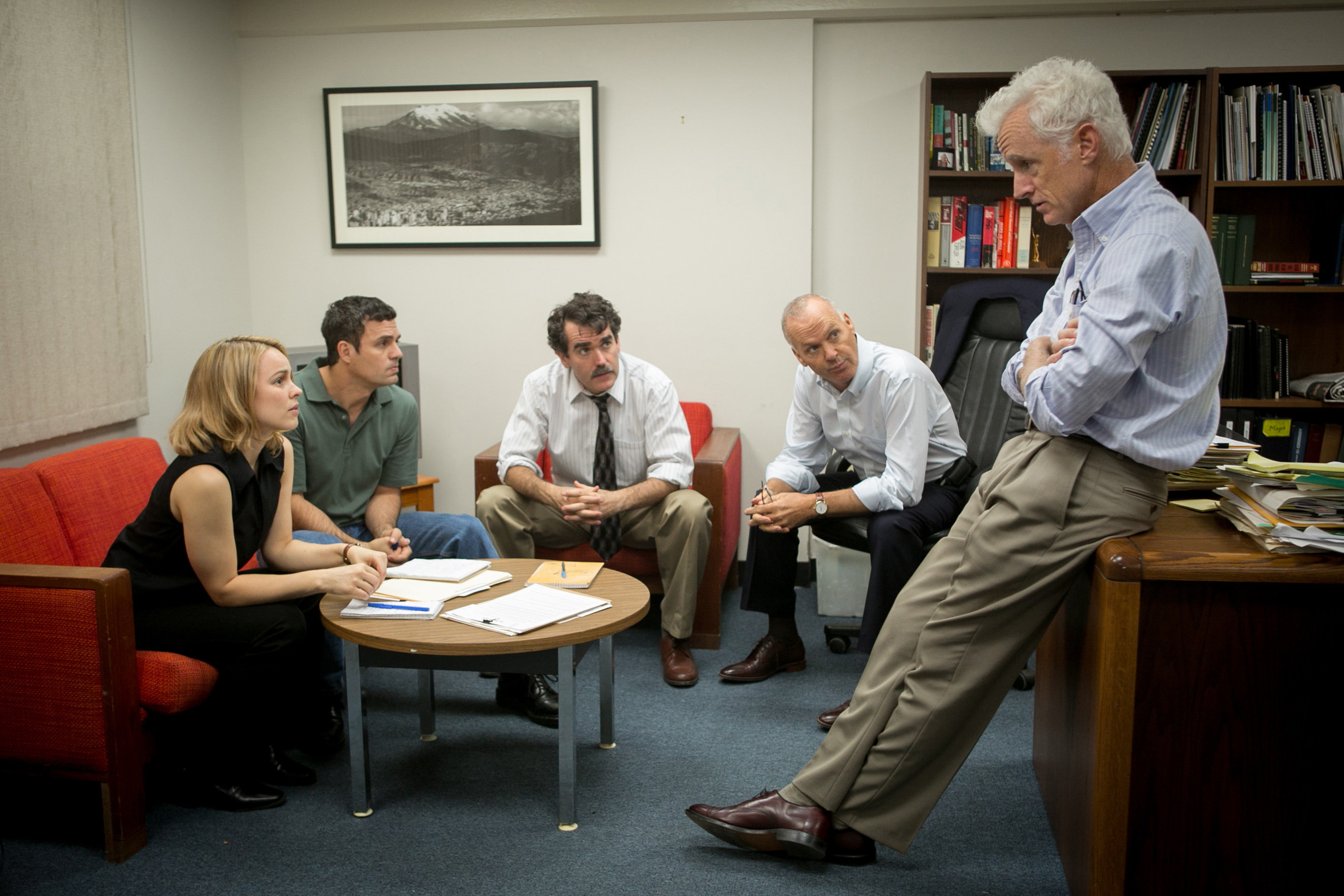WASHINGTON — Hollywood has seen the light, born again in print journalism.
In an age of sensationalized stories, rushes to judgment and half-baked reporting to feed the 24-7 beast, along comes a special film celebrating patience, fact-checking and long-term investigations.
It also might just be the best movie of the year.
Full stop.
“Spotlight,” which made its D.C. premiere last month at the National Portrait Gallery for the Investigative Film Festival, hits movie theaters Friday for the general public, instantly becoming the “All the President’s Men” (1976) for our time with a portrait of print journalism done the right way.
It tells the true story of The Boston Globe journalists who won a Pulitzer Prize by uncovering the child sex-abuse scandal by the Catholic Church, a story that flew under the radar around 9/11.
Walter “Robby” Robinson (Michael Keaton) heads up the newspaper’s long-term investigative unit known as “Spotlight,” a group of pavement-pounding reporters including Sacha Pfeiffer (Rachel McAdams), Mike Rezendes (Mark Ruffalo) and Matt Carroll (Brian d’Arcy James), who operate under the watchful eye of editors Ben Bradlee Jr. (John Slattery) and Marty Baron (Liev Schreiber).
“We always thought we had to write it for the journalists. If we could get past the journalist test, then we were on the right track,” director Tom McCarthy tells WTOP. “We just tried to depict it as realistically as possible. We felt like we didn’t need to over-dramatize or sensationalize the material. We just relied on good old-fashioned storytelling in a very, very compelling subject matter.”
McCarthy, whom you’ll recognize as Dr. Bob in “Meet the Parents,” cowrites the script with Josh Singer, who penned episodes for “The West Wing,” “Lie to Me” and “Fringe” before adapting Daniel Domscheit-Berg’s “WikiLeaks” book into the Julian Assange flick “The Fifth Estate” (2013).
“We had such wonderful access to all of the reporters,” Singer tells WTOP. “Tom and I, writing the film together, we spent a ton of time with all of these guys. Frankly, it’s nice to be back here in D.C., because Marty Baron, who was at The Globe at the time, is now at The Post. He’s done great work for The Post, so I hope everyone will appreciate what we’ve done with his character.”
The real-life Baron joined The Washington Post in 2012, taking over as executive editor. That position was, of course, made famous by Ben Bradlee Sr., whose Watergate coverage was immortalized by Jason Robards’ Oscar-winning role across Robert Redford and Dustin Hoffman.
Who better to play Bradlee’s son than the silver fox himself, Roger Sterling from “Mad Men?”
Slattery is perfectly cast as the tough-as-nails editor who wants to sit on the story until it’s as comprehensive as possible. This forces Ruffalo and McAdams to gather more sources, more clues and more deep-background confirmations, delivering brilliant performances of detective desperation. Thankfully, the screenwriters resisted studio notes to fabricate a romance between the two.

“They’re great actors and they were the right people for the role. It’s really that simple,” McCarthy says. “We were fortunate enough to get those people, and you’ll see in the film, they’re just spot-on. They lead a very, very large and talented ensemble. … It’s a particularly talented group of actors.”
Perhaps most poignant is the contrast between Keaton’s Boston native and Schreiber’s non-Boston outsider. The latter’s Jewish background provides the proper distance and perspective to objectively investigate the Church, while Keaton displays an authentic anguish upon his epiphany that he’s been too close to his Irish Catholic subjects — to the point that he missed the corrupt forest for the trees.
And that’s what makes “Spotlight” so powerful. More than just a compelling tale of investigative journalists, it’s a fascinating social commentary on an entire city’s complicity in the cover-up of criminal activity. With a major assist from the great Stanley Tucci as a lawyer willing to drop hints to the “Spotlight” team, the film paints plenty of similarities between Boston and Happy Valley, where Penn State’s handling of the Jerry Sandusky child sex-abuse scandal became a national disgrace.
No one wants to admit a beloved football coach is abusing a community’s youth, just like no one wants to suspect the family priest is a pedophile. In both cases, a lot of people knew a little, but the perpetrators were allowed to operate in the disgusting shadows for years. After all, why explore rumors when your personal comfort is at stake? Why doubt the blind trust you give to the very man in your confession booth? Sometimes we have to make ourselves uncomfortable to expose the truth.
Which brings us to the well-documented Catholic Church scandal, which left a dark stain on an institution that has otherwise done phenomenal charitable work for the impoverished around the world. Billions of Catholics are faithful believers, loving souls and admirable citizens. “Spotlight” doesn’t wish to slander these people; it wants to shine a light on a cancer that has rotted the institution from within and disillusioned so many who might have otherwise joined the religion.
Fittingly, the D.C. premiere of “Spotlight” came exactly a week after Pope Francis’ historic visit to the White House and just days after the pontiff met with sex-abuse victims in Philadelphia. If that’s not the perfect example of a movie capturing the zeitgeist of its era, I don’t know what is.
“There’s an interesting synergy to that,” McCarthy says. “Maybe this film on some level, outside of hopefully being a good story, will forward the dialogue that needs to happen.”
These themes of institutional corruption made “The Wire” creator David Simon the perfect host for last month’s “Spotlight” Q&A at the National Portrait Gallery. After all, Simon had just conducted a five-season exploration of societal rot in the city of Baltimore. In fact, it was “The Wire” that inspired McCarthy to want to make a journalism film, after being cast in Season 5 as a reporter at The Baltimore Sun, where Simon himself worked from 1982-1995.
“Reporting to me was as (H.L.) Mencken said, it was the life of kings when it was done well,” Simon tells WTOP. “Watching it, it was kind of like porn for me. It was nostalgic porn.”
Simon’s turn of phrase is more clever than you think: journalists actually used to type “XXX” to denote the end of an article before they switched to the “–30–“ post-script. But Simon says the lack of graphic material makes a project like “Spotlight” hard to convince studio executives to greenlight.
“It’s the kind of film that doesn’t get told enough because it lacks all the things that the entertainment industry thinks is currency. There’s not a lot of sex in it, not a lot of violence, but there’s a lot of ideas and a lot of humanity,” Simon says. “The actual stakes of something that we all should be vested in as a society is laid bare. … So to see it executed as well as it was … I’m delighted it got made.”
Like Simon, you’ll marvel at the film’s restraint in finding the perfect moment to cut to black before the end credits. You’ll also delight in the film’s nimble handling of old tools, emphasizing the power of physical paper, ringing telephones and archived handbooks hidden among stacks of library shelves. We all know the benefits of modern technology in our ability to multitask and make our world more interconnected. But perhaps we as a society lost something when we all got in a damn hurry.
While so many blockbusters follow rapid pursuits, “Spotlight” exposes the power of patience. It can teach journalists and filmmakers a lot, as flashy flicks and sensational articles often suffer from the same disease. As Schreiber says, “They make a lot of noise, but change things not one bit.” Expect “Spotlight” to make plenty of noise this award season, only in this case, it might just change the world.
–30–

The above rating is based on a 4-star scale. See where this film ranks in Jason’s Fraley Film Guide. Follow WTOP Film Critic Jason Fraley on Twitter @JFrayWTOP.







